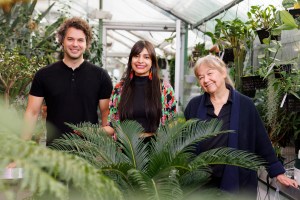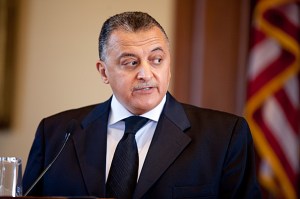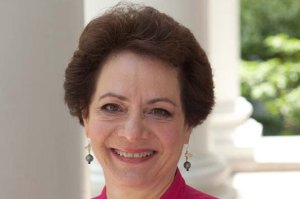All articles
-
Nation & World
The secret lives of boys
Based on years of interviews with teenage boys, author and Harvard graduate Niobe Way examines the intimate nature of close friendships between young and early adolescent boys.
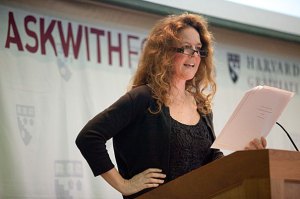
-
Campus & Community
American Academy elects 20 faculty
Twenty from Harvard are among the 212 new members elected to the American Academy of Arts and Sciences, one of the nation’s most prestigious honorary societies and a leading center for independent policy research.

-
Campus & Community
New leader of Nieman Foundation
Ann Marie Lipinski, former editor of the Chicago Tribune, has been named curator of the Nieman Foundation for Journalism at Harvard. She succeeds longtime Nieman curator Bob Giles.
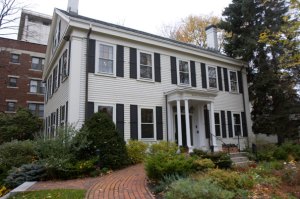
-
Science & Tech
Climate change for the long haul
Human-induced changes to the Earth from emission of greenhouse gases are here to stay, with computer models showing that changes made by 2100 could take 1,000 years to decline.
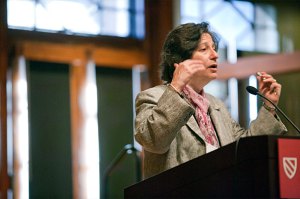
-
Arts & Culture
‘Lost’ with Carlton Cuse
Harvard graduate and award-winning producer Carlton Cuse ’81 returned to campus to offer students a look behind the scenes at his TV show “Lost” and insight into his creative process.
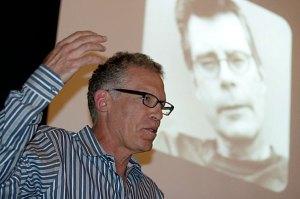
-
Campus & Community
Two students named Anne Wexler Scholars
Social enterprise solutions to long-term poverty and research into malnutrition among Australian indigenous people are the two topics that will be the focus of two Harvard students receiving inaugural Anne Wexler Australian-American Studies Scholarships in Public Policy.
-
Campus & Community
HKS announces endowed professorship
The Harvard Kennedy School (HKS) has announced the establishment of the James R. Schlesinger Professorship of Energy, National Security, and Foreign Policy, an endowed professorship honoring one of the most accomplished public servants of our time.
-
Campus & Community
Looking ahead
He’s an economist, a researcher, and a physician, and he’s about to become provost. On the day (April 15) that President Drew Faust announced that he would be Harvard’s next provost, Alan M. Garber ’76 sat down with the Gazette to talk about his career, his new role, and facilitating connections across traditional academic boundaries…
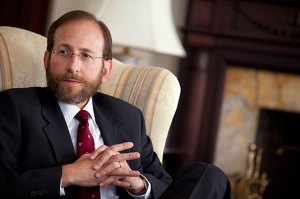
-
Campus & Community
Garber welcomed as provost
At a welcoming reception, Harvard President Drew Faust relayed the praise she received for incoming Provost Alan M. Garber ’76 throughout her search for a replacement for Steven E. Hyman.
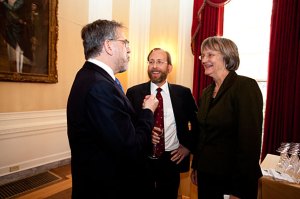
-
Campus & Community
Warrior spirit
Five years ago, Andrew Kinard lost his legs in Iraq. After 75 surgeries, he’s tackling other big goals, from a Harvard education to the Boston Marathon.
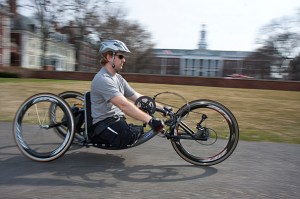
-
Campus & Community
William Lipscomb dies at 91
William Nunn Lipscomb Jr., emeritus professor and winner of the Nobel Prize in chemistry in 1976, died at age 91 in Cambridge, Mass., on Thursday (April 14) of pneumonia and other complications resulting after a fall.
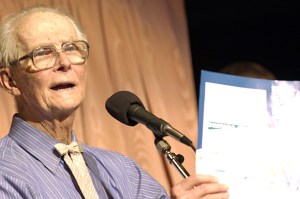
-
Campus & Community
Alan Garber named provost
President Drew Faust announced that Alan M. Garber ’76, the Henry J. Kaiser Jr. Professor, and professor of medicine and economics at Stanford University, will become the next provost of Harvard University.
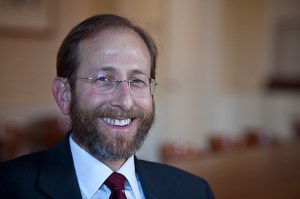
-
Health
One vaccine for two strains?
Harvard Medical School researchers believe that identifying the properties of the herpes viruses found in Africa could open the door to developing a more potent vaccine against an infection now rampant in sub-Saharan Africa.
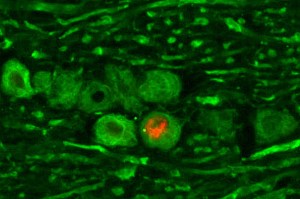
-
Science & Tech
I Am My Filter and more
Students presented projects Wednesday (April 13) from the Idea Translation Lab, which pushes students to turn ideas into reality and sets them up to take the next steps in project development.
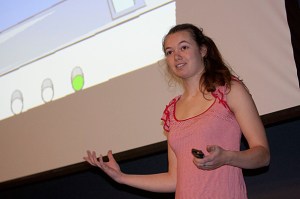
-
Campus & Community
Harvard scientist wins Sackler Prize
Harvard Professor of Chemistry and Chemical Biology and of Physics Xiaowei Zhuang has been awarded the Raymond and Beverly Sackler International Prize in Biophysics, awarded at Tel Aviv University.
-
Campus & Community
Faculty Council meeting held April 13
At its twelfth meeting of the year, the Faculty Council heard proposals regarding the description of the Standing Committee on Public Service, study abroad in Freiburg, and the description of the Standing Committee on the Library.
-
Science & Tech
Learning to love the irrational mind
Just how much should we allow “human nature” to guide our politics — and our everyday decision making? Columnist David Brooks and a trio of Harvard analysts debated new findings on the unconscious mind during a panel discussion.
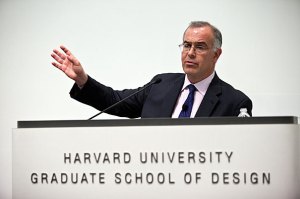
-
Nation & World
New Chinese student program
Strengthening its educational ties to China, Harvard has entered into an agreement with the China Scholarship Council that will offer yearly fellowships for up to 35 Chinese students to attend the University at the graduate level.
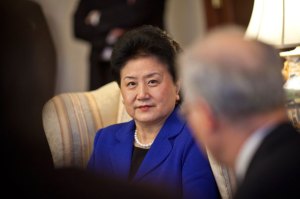
-
Science & Tech
The ‘quantum magnet’
Harvard physicists have expanded the possibilities for quantum engineering of novel materials such as high-temperature superconductors by coaxing ultracold atoms trapped in an optical lattice — a light crystal — to self-organize into a magnet, according to an article in the journal Nature.
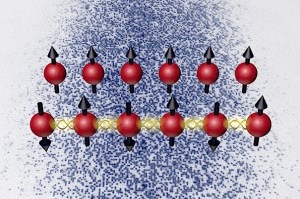
-
Arts & Culture
Lasting power
Using personal narratives, several Harvard scholars recall experiences with their faiths with the help of objects in the Harvard Art Museums’ collections.
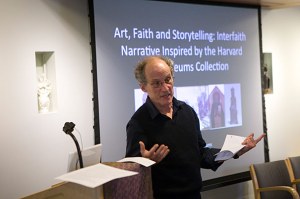
-
Arts & Culture
Art of the ‘Divine’
“The Divine Comedy,” a daring and grand exhibit in three parts, gives a modern spin to Dante’s three realms of the dead, and shows how art can break disciplinary boundaries.

-
Arts & Culture
A vanishing neighborhood
Two Harvard ethnographers directed the prize-winning “Foreign Parts,” a documentary that captures the sights and sounds of Willets Point, a vibrant, vanishing corner of New York City.
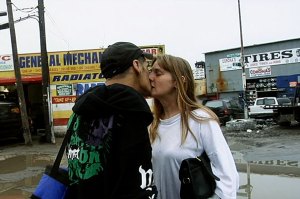
-
Campus & Community
Sustaining the momentum
From a Medical School team that switched to reusable materials to trim waste to a Business School move to make its executive education programs sustainable, teams and individuals from around the University were recognized for their efforts to make Harvard greener in the annual Green Carpet Awards.
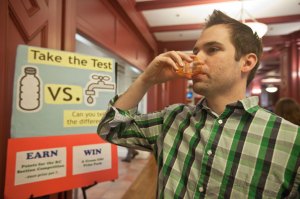
-
Arts & Culture
High Financier: The Lives and Time of Siegmund Warburg
This biography by Niall Ferguson, Laurence A. Tisch Professor of History and Professor of Business Administration, chronicles the life of Siegmund Warburg, a financial wiz, prophet of globalization, and strategic businessman.
-
Arts & Culture
His Majesty’s Opponent: Subhas Chandra and India’s Struggle Against Empire
Gardiner Professor of Oceanic History and Affairs Sugata Bose parses the life of Indian revolutionary Subhas Chandra Bose, who struggled to liberate his people from British rule and led the Indian National Army against Allied Forces during World War II.


